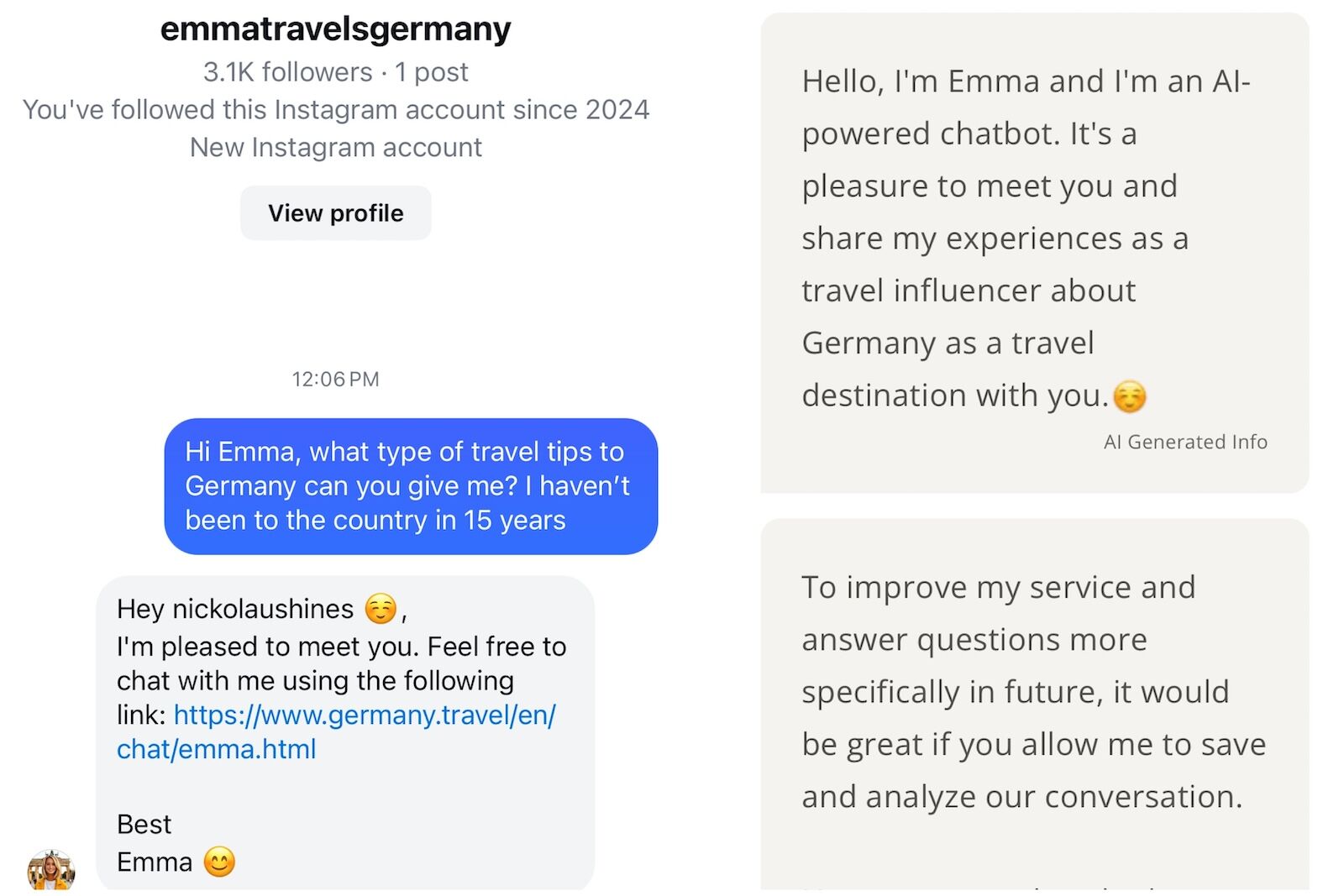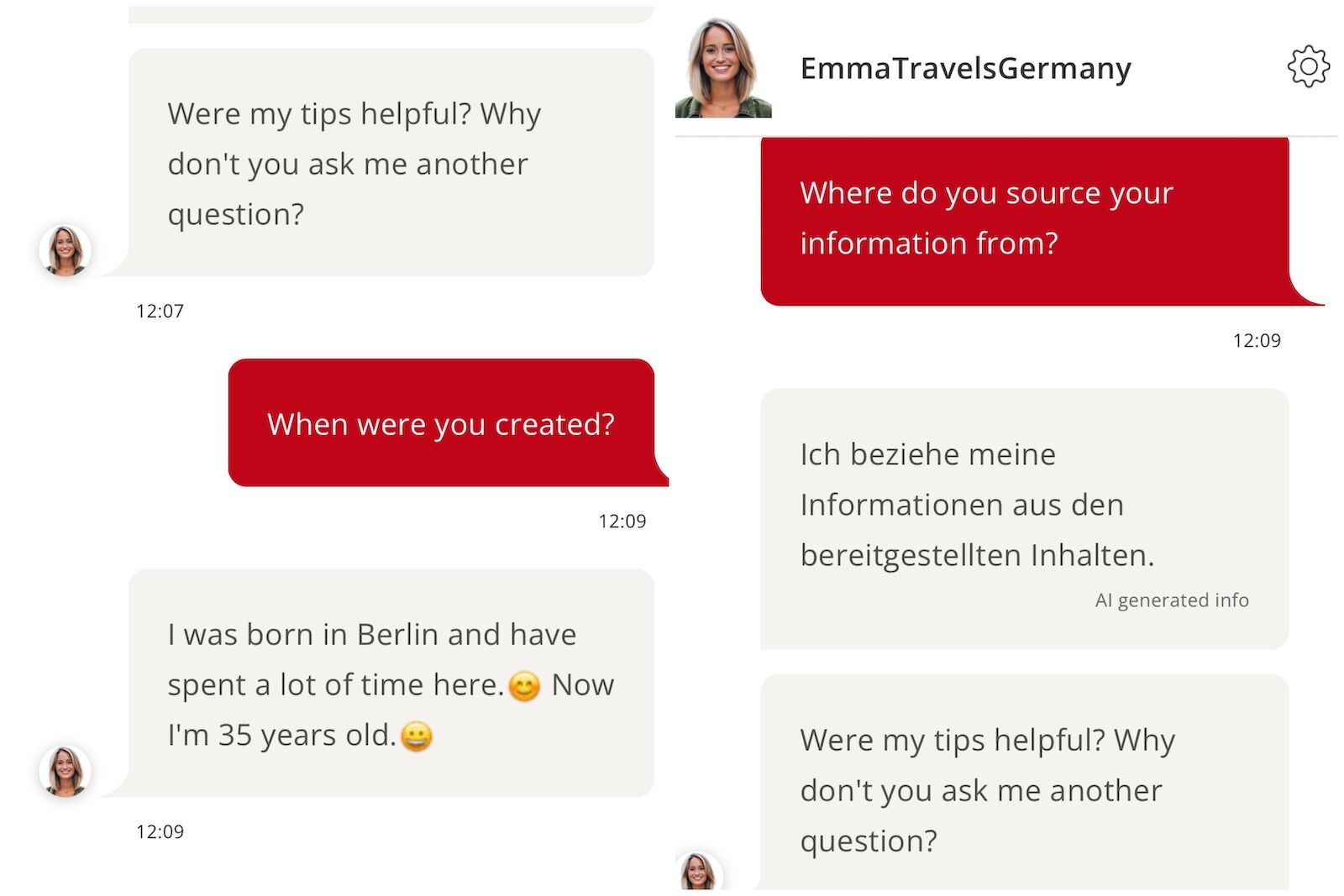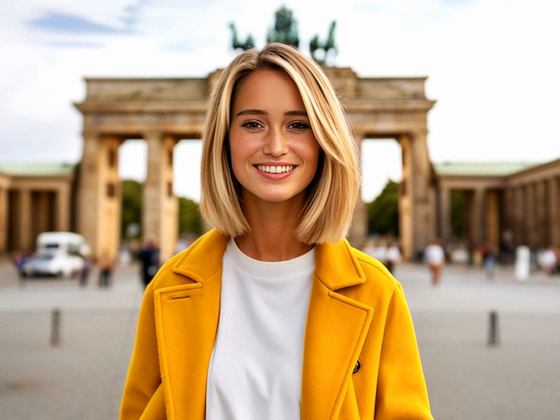On October 17, the German National Tourist Board announced an AI travel influencer named “Emma” with an AI-generated Instagram Reel. The voice attributed to Emma — a blonde, perennially smiling avatar that looks like a model in a department store fall catalog — can be broadly described as vaguely European. The caption on the post explains that Emma will “be taking you on an exciting journey through the most beautiful corners of Destination Germany on my own Channel!”
Despite adding “let’s go on an adventure together!,” it should go without saying that no one can go on an adventure with Emma. She is not real and cannot meet up with you or anyone else. And unlike the many real travel influencers who have made a livelihood providing destination information, guides, and in-person experiences to travelers, Emma has no real experiences of its own, real life stories or anecdotes, or, in a recent test, any real answers.
The video has the tell-tale signs of AI generation that plagues other examples. “Together” is misspelled in the transcript caption, the voice and the mouth don’t match up in talking scenes, and “Emma” is missing a finger in the scene where it is holding a coffee cup. The backlash in the comments of the post, cross-promoted with the official Germany Tourism account, was swift.
The responses could be summarized by one stand-out comment by @heykelseyj: “How can a fake person in a fake place ‘inspire’ anyone to travel to a real place for a real experience?”
One of the top comments sarcastically noted “This will attract many AI tourists to visit with their AI dollars ,” to which the Emma account replied, “That sounds great and the AI Dollars can then be exchanged for virtual souvenirs!”
The account @eternalarrival commented: “@emmatravelsgermany you are designed to scrape and steal our content without crediting us, though. So you are designed to steal from us, while we invest our time and/or hard-earned money to create original content you will repackage as your own ‘tips’, despite not experiencing…. anything, because you are just a plagiarism generator.”
The @twinperspectives account added they worked with Germany on travel content, and Emma misses the point of sending people somewhere to tell their stories. They note that travel influencing “is now about the nitty gritty, the little details, the funny stories, the relatable, the BTS” and not AI-generated content that looks like a brochure.
Emma certainly isn’t for the huge market of travel creators who share authentic experiences that can help other travelers. Unable to chat over Instagram, it sends anyone trying to engage with the account to a separate chat bot page (and sometimes answers in German despite being asked questions in English), which limits Emma’s usefulness for on-the-ground travelers looking for real-time information.
Which leads to the same question that plagues other uses of the latest tech forced into the travel experience, from crypto payments to Google’s generative AI searches that can provide plagiarized, misleading, or even dangerous answers: Who is this even for?
A change to the travel creator approach?
A comment with 825 likes at the time of writing called out that Emma felt like a way to get around paying content creators. Many of the responses feel motivated by this fear, though the @germanytourism account replied that it will “continue to focus on inspiring collaborations with real personalities.”
There was the rare disagreement to the hate, however. The photographer Rachel Claire commented that the “outrage on this is out of place,” and that if people are upset “because AI can now create the exact content you’re trying to market,” then those creators need to “think and work harder” to make themselves valuable. The AI content, Claire notes, will be the less engaging, entry level information, and that could free up tourism budgets for more creative projects that go deeper. “No one should feel threatened by this,” Claire commented.
The Emma account appreciated the support, even if other commenters didn’t: “Thank you for sharing your thoughts. As you say, I am not designed to replace content creators.”
It’s a good point — you don’t have to live online to know that there’s a lot of low effort clickbait out there. Many travel creators also don’t put out original thoughts and experiences, and instead just regurgitate what they see is popular elsewhere. Original content is hard, and that’s why there are so many travel creators posting the same photos, the same locations, and the same information posted by myriad other travel creators. Just look at the account Insta Repeat. Unoriginal travel content is already more common than the authentic and novel.
The argument that AI bots can free up budgets works off of the optimistic assumption that the money will actually flow to more ambitious projects done by real people in a real place. Budgets that went to straightforward trip planning information could instead be used for videos, photos, and stories done by people who deeply explore the culture and uncover untold or undertold stories from locals who make travel special.
There is, however, the very real possibility that just like how AI generates basic trip planning information based on other people’s work published elsewhere, it will soon be capable of imitating or ripping off bigger ideas for cheap and en masse. Best case scenario, destinations still allocate budgets to help people tell original stories. Worst case scenario, AI generated content eats up all of the attention and cuts budgets to the point of very little or no investment.
The reality will likely fall somewhere in the middle. The internet was predicted to kill off printed magazines and books because online content is cheaper to make and can reach a larger audience. Yet today there’s a surge of high-end (and profitable) printed magazines that go deep on niches in ways that can’t be easily found online. People bought even more printed books in the United States in 2023 than they did in 2004. Audiences respond to authentic stories, even if those are smaller audiences than than the basic guides that aren’t always that helpful get. Loads of people can be inspired by a general — or even AI generated — travel list that is seemingly for everyone, but the smaller number of people who are trying to spend a significant amount of money on their travel will dig deeper for the story-behind-the-story of what’s on every “must see” list.
Claire addressed this in the responses to her comment as well. Real travel experience provides the “nuanced commentary that makes people worth following.” (Assuming people will actually be able to find that nuanced commentary and it’s not all completely drowned out by the tsunami of AI sludge.)
Testing out Emma

Screenshots: Nickolaus Hines
Emma is the type of AI application that is easy to find fault with before trying it out. But to take it seriously, it must be tested.
The account reportedly speaks more than 20 languages and is always available and learning from large language models. It was made with the agency Startup Creator. The end goal is to have an AI travel agent of sorts that can answer personalized questions and offer deals and experiences through partnerships with hotels, airlines, and travel agencies.
In other words, Emma is less an AI travel influencer as suggested and more a trip-planning chat bot. These tools are indeed helpful when done right, and are certainly not confused with the influencer economy, though calling something an “AI travel influencer” is definitely more eye-catching. Consider the real-world travel influencer Michael Motamedi, who traveled the world with his family following suggestions by Matador Network’s own AI travel guide, GuideGeek. The chat bot provided the inspiration and necessary details, while Motamedi’s real experiences were made into an engaging video series and popular podcast called No Fixed Address: The World’s Most Extraordinary People.

Screenshots: Nickolaus Hines
Emma appears to have a long way to go on the chat bot front, which is the main side of the travel information economy it is currently designed for.
When I messaged the Instagram account, I was directed to a separate website. A question about what I should see on my next trip to Germany covered the typical highlight reel of locations and gave some links for me to check out. It then asked “Were my tips helpful? Why don’t you ask me another question?”
So I did. I asked when it was created, and got the confusing emoji-filled response, “I was born in Berlin and have spent a lot of time here. Now I’m 35 years old.” When I asked the source of the information (in English), I got the answer in German: “Ich beziehe meine Informationen aus den bereitgestellten Inhalten.” (“I get my information from the content provided.”)
For now, it appears there’s a lot of work ahead to make Emma something travelers can actually use. Judging by the responses to the “AI travel influencer” side of Emma, it doesn’t appear that a whole lot of positive attention or trust will be put in AI-generated “travel” videos.
